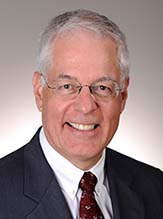
C-suite scrutiny: Why does inclusion matter so much to Supply Chain?
With all of the organizational pressures that Supply Chain endures to keep clinicians and administrators capably fortified, particularly during a global pandemic straining the abilities and boundaries of the supply chain already, one wonders why those in healthcare would even want to be kicked upstairs to the C-class. Eight healthcare supply chain executives and leaders respond to Leaders & Luminaries’ query.

Rand Ballard
Rand Ballard, Chief Customer Officer, Vizient Inc., Founding Sustaining Sponsor
“Most non-healthcare organizations highly value their supply chain leaders, pay them extremely well and include them at C-suite levels. This is because, regardless of industry, whether manufacturing heavy equipment or pharmaceuticals, supply chain has a huge impact on organizations’ financial and operational success.”

Carl Meyer
Carl Meyer, Bellwether Class of 2019, Vice President, The Wetrich Group
“Because what Supply Chain does is mission critical, and for them to be the most effective, they need the C-suite to understand that Supply Chain can be a strategic advantage in meeting their patients’ needs while improving outcomes.”

Jim Francis
Jim Francis, Bellwether Class of 2017, Chair, Supply Chain Management, Mayo Clinic
“I don’t think being in the C-suite is necessary to be effective at your job. It may help advance the profession in the industry but not necessarily enable you to do your job more effectively.”

Siobhan O’Bara
Siobhan O’Bara, Senior Vice President, Industry Engagement & Services, GS1 US Healthcare, Silver Sustaining Sponsor
“Supply chains need continuous investment, and to earn it, they need executives to understand what the supply chain contributes to the organization’s success. When the C-suite realizes that supply chain excellence actually drives a healthier bottom line and improved patient outcomes, they’re likely to continue providing the funds needed to optimize results. Supply chain professionals need to capture CEO attention so they can demonstrate the value of how supply chain operations can drive long-term benefit to the organization.”

Shaun Clinton
Shaun Clinton, Senior Vice President, Supply Chain, Texas Health Resources, Bronze Sustaining Sponsor
“There are many reasons, but I think it is important for anyone making decisions on how resources are to be utilized to include voice that is often most responsible for getting the resources in the right place.”

Tom Lubotsky
Tom Lubotsky, Senior Vice President, Supply Chain, Allina Health, Bronze Sustaining Sponsor
“In other industries outside of healthcare, supply chain is considered and treated as a strategic asset that enables not only efficiencies but instrumental toward creating higher customer value and growth. Too often, supply chain in our healthcare industry today carries a traditional mindset centered on better price controls and the assurance of having enough product on hand. Supply chain touchpoints permeate every care transaction and is becoming more reliant on services as well that support patient care rendered today. Moreover, with consumers demanding more than ever a higher level of access and convenience besides better pricing, a clear supply chain strategy and investment to deliver these requirements will be ever so important. Implications on delivering a digitized supply chain capability will require an investment to enable these consumer requirements to be met.”

George Hersch
George Hersch, Bellwether Class of 2019
“Supplies and purchased services are taking an ever-increasingly dominant role in healthcare expense management. So too have revenues achieved from contract administrative fees (CAFs) a large percentage of which are returned to the healthcare system from the GPOs based on contract utilization. The impact of documentable savings initiatives and CAF revenues have continued to invite close scrutiny of top leadership. This scrutiny should be welcomed by Supply Chain leaders because of its increasing importance to the healthcare organization. Supply Chain leaders should be placed in positions of influence allowing them to require accountability from other leaders in the organization. This will accelerate the adoption of important cost-saving initiatives to improve the financial health of the organization.”

Dee Donatelli
Dee Donatelli, Bellwether Class of 2015, Vice President, Professional Services, symplr
“When an organization recognizes supply chain with a promotion to chief officer it improves not only the overall performance of the entity but also allows supply chain to become a critical element in the success both financially and clinically. The key is the way in which other executives recognize supply chain. It promotes a much greater collaboration in decision making as well as outcomes both financially as well as clinically.”